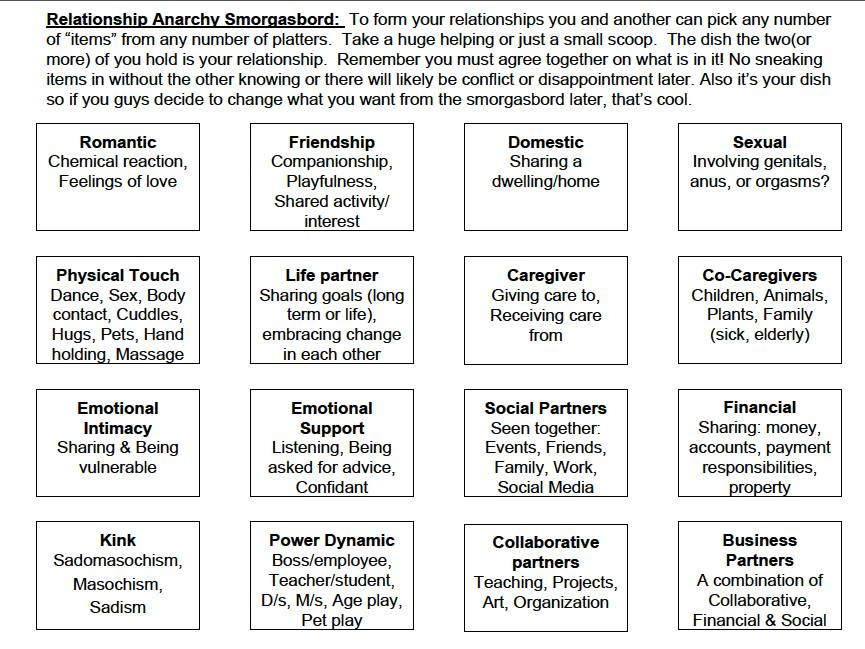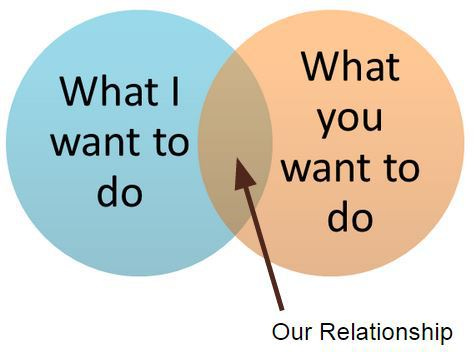Relationship Anarchy: A Personal Manifesto
UPDATE 9/17/2024: rather than “relationship anarchy,” this approach may be better described as relationship libertarianism.
People often ask me what relationship anarchy is. The honest answer is that I’m not sure. The term was originated by Andie Norgren in her instructional manifesto. Wikipedia defines it as “the belief that relationships should not be bound by rules aside from what the people involved mutually agree upon.” Other people find it more difficult to define. The Thinking Asexual has a long (and excellent) discussion of what it means.
Given that there is so much ambiguity surrounding the approach, I am writing out what it means to me. This is simply my personal definition; it’s not intended to apply to anyone else unless they choose to adopt it. RA is still new, and while we may settle on a consistent philosophy eventually, as of right now, I don’t think anyone has any need to adopt anyone else’s view. So what follows is my personal relationship philosophy, which I’m calling “relationship anarchy” because I don’t have a better term for it. If you disagree, that's fine. It's certainly not for everyone.
The other caveat is that this philosophy applies only to non-dependent social and intimate relationships. When you’ve agreed to be the caretaker for someone who, due to age, disability, or life circumstances, cannot care for themselves, different considerations apply. Ditto for non-social relationships such as employment, parental, professional, or similar relationships. This only applies to people who you meet in social situations who could be potential friends, lovers, romantic partners, etc.
Relationships Should be Flexible, not Rigidly Categorized
Friend, acquaintance, lover, spouse, significant other, partner, etc. are just words we use to describe the people in our lives. They are not boxes to put people into or markers of a person’s importance in our lives. Having a particular relationship category or status doesn’t imply anything beyond what’s been explicitly agreed. In particular, the presence or absence of a sexual relationship does not determine a person’s importance. As The Thinking Asexual puts it:
Relationship anarchy goes further than polyamory in its departure from the monogamous norm. Relationship anarchy does share with polyamory an overall rejection of sexual and romantic monogamy, its common rejection of legal/institutional marriage, etc, but it also seeks to completely break down what I like to call the Romantic Sex-Based Relationship Hierarchy by erasing relationship categories determined by the presence or absence of sex and/or romance. Relationship anarchy consequently creates equality of all personal/intimate relationships, behaviorally and emotionally. The freedom to interact and value one’s relationships starting with a blank slate, distributing physical intimacy, sexual intimacy, emotional intimacy, etc. according to one’s desires rather than preexisting rules and categories of relationship types, is an expression of this equality.
Sex and romance do not make a relationship more important. The absence of sex or romance does not make a relationship less important or mean that something is missing any more than the absence of kayaking means something is missing. Sex is an activity. It is not inherently more important than any other activity. Romance is a certain way of relating, which is only one of a vast panoply of ways two (or more) people can relate to one another.
Relationships Can be Whatever We Want
The people in a relationship are the ones who get to determine the terms of that relationship. There is a certain minimum standard for acceptable ways for people to treat others. Many of them are expressed in our criminal and civil laws, though many of them are culturally determined and enforced. Regardless, most of us agree that there is a certain amount of respect and consideration that should be given to all people. But that baseline is a starting point, and can be modified as people see fit.
Other than that baseline, no assumptions should be made. Everything about a relationship, from how we communicate to how we express affection to what activities we do together, is determined by mutual desire and consent. Every relationship should begin with only barest minimum of assumptions, and all expectations should be made explicit and consensual. This image has been floating around the internet, reportedly created by someone in a Vancouver polyamory group, and I think it describes my thoughts nicely:
Everyone Should Do Whatever They Want As Much of the Time as Possible
My relationships are based in enthusiastic mutual consent. Basing relationships in enthusiastic consent means encouraging people to pursue their own happiness, not make sacrifices for a partner. In fact, I reject the whole concept that people are obligated to sacrifice for others’ benefits. When I feel genuine affection for someone, doing something that benefits them doesn’t feel like a sacrifice at all. When I think about meeting the needs of the people in my life that I care about most, there is nothing about that concept which requires me to feel bad or give up anything. Doing nice things for the people I care about makes me feel good. Even if technically I lose some kind of resource like money, time, or energy, it’s only because that’s what I want to spend that resource on. It’s the use that will make me happiest.
The last thing I would want from someone I care about is to sacrifice on my behalf. The more I love someone, the more important it is to me that my love is empowering, not limiting. It is extremely important to me that I add to people’s lives, not subtract. People should never feel obligated to do anything because of our relationship, and our relationship should consist 100% of things we both want to do. I’ve previously conceptualized it this way:
As you can see, the idea is that “a relationship” consists of the activities that both people genuinely want to engage in. Anything that I want to do that you don’t want to do, we don’t do. I either do that with someone else who consents, I do it alone, or I just don’t do it.
This is the key aspect of relationship anarchy to me. Neither of us expects the other to do anything we don’t want. Do we both want to have a date tomorrow night? Then let’s do that! Do you want to have dinner, but then go to a movie with a different person? That’s fine, so long as dinner sounds fun to me! Do you want to be romantic, but not sexual? That’s an option! Do you want to create something together, but don’t want to be romantic? If it sounds good to me, let’s do that! Don’t want a relationship? Then we won’t have one!
Don’t like the restaurant I picked? Cool, we don’t have to go there. But I’m going to want to go there eventually, so if you never want to go there, it might just mean that I will go there without you sometimes, which is fine. Would you rather eat there than not see me during that time? Then you’re welcome to come along, but please don’t frame it as a sacrifice you’re making on my behalf. You’re coming along because that’s what makes you happiest in this situation, and nobody owes you anything because of it. I will appreciate that seeing me is important enough to you that you will go to a restaurant that you don’t like, but what I choose to do with that appreciation is my choice.
One of the most important things to me in relationships is that my relationships have as little downside as possible. By that, I mean that having a relationship with me should not be limiting in any way. I want you to have the same amount of freedom while having a relationship with me that you do without our relationship. Our relationship should never mean you have to give up something you want. Obviously, this is an ideal and not a practical reality. People being human, having intimate relationships is sometimes going to involve sacrifice, but I aspire to have it be as little sacrifice as possible.
This is why I’m against rules in relationships. Rules are attempts to limit someone’s future options. Rules are about stopping people from doing what they want. Having relationship rules stands in direct opposition to my whole concept of how a relationship should work.
The Only Obligations are Honesty and Boundary Respecting
Relationships should involve as few obligations as possible. Particularly, no relationship should ever involve an obligation to continue having the relationship if it’s not making all participants happy. Every non-dependent relationship should always have, built in, the option to end the relationship at any time with no shame or guilt. Consent must be ongoing, so any consent-based relationship must only last so long as all parties enthusiastically consent.
The need for ongoing consent applies not just to the decision to have the relationship, but to all terms of the relationship. Any party can revoke their consent to any aspect of the relationship at any time. A party cannot unilaterally add anything to a relationship (that takes all parties’ consent), but anyone can take any aspect or term off the table at any time.
There are only two obligations that are inherent in any consent-based relationship: honesty and respecting boundaries.
Respecting boundaries is simply a part of valuing consent. Part of having a consensual relationship means that nothing gets done that hasn’t been authorized. Respecting people’s boundaries is simply a manifestation of basing a relationship in mutual desire.
Honesty is implied in a relationship because valid consent must be informed consent. Dishonesty destroys the informed nature of that consent. A person cannot agree to something if they don’t know all the terms of the agreement. Dishonesty makes informed consent impossible. “Honesty” is a somewhat ambiguous term, but here is the conception that I favor.
Conclusion
Wikipedia’s definition of relationship anarchy - “the belief that relationships should not be bound by rules aside from what the people involved mutually agree upon” - while simplistic, is probably the most succinct statement of my approach, with the caveat that rules should also not be imposed by the people in relationships unless everyone agrees on an ongoing basis. The best relationships are the ones in which the participants do only the things which everyone wants to do. This ensures that relationships are consensual, rewarding, and respectful of each person involved.




